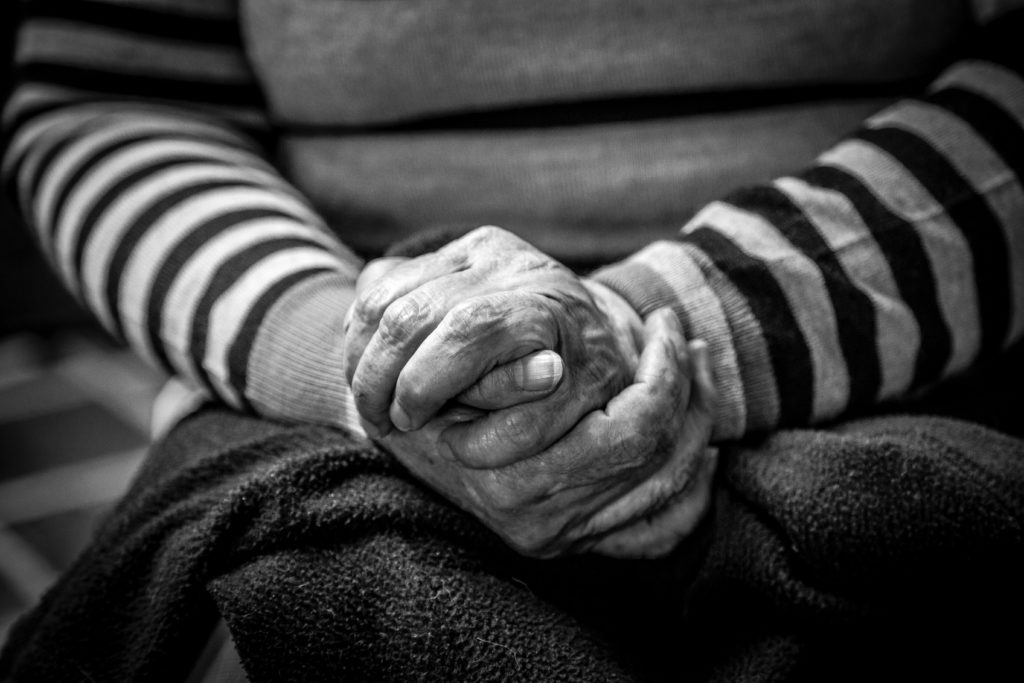Meet my Aunt.
A self-funded retiree, she is now well into her eighties and owns a $1.5 Million dollar house in an inner Melbourne suburb. From the outside her house looks only slightly messier than the other neat federation terraces in her street.
Inside, however, it’s a completely different story.
The house is dark and smells musty. The roof has leaks. Paint peels off the walls in every room. The lights have been out in the hall and her bedroom for years. She has no hot water, never fixing her heating unit, which broke down about 20 years ago.
The half-polished floor boards have long disappeared into semi-chaotic piles of invoices, newspaper clippings, direct mailers, ancient magazines, brochures and unidentifiable notes.

Photo by Jorge Lopez on Unsplash
My Aunt will tell anyone who’ll listen that she’s not like other Australians.
She insists she’s not a house proud like an “Australian housewife.”
Instead she’ll say she’s a thrifty Scot.
That thriftiness means that she wears jumpers that are more patches than stitches. When she’s been out in the street lugging her bags and battered shopping trolley, people have offered her money unprompted, thinking she’s destitute and in dire need of the cash.

Photo by Jesse Williams on Unsplash
At my 21st birthday she washed the paper plates to take home and re-use.
Last week I found a neat pile of recycled paper plates in her cupboard. These may not be the same plates from all those years ago, but there’s a very good chance they are.
In the 1980’s my Aunt was sacked from her administration job at the local council.
It takes a special gift to be sacked from a local government body in Australia in the 1980’s. My Aunt’s particular workplace talent was appalling rudeness, which naturally upset her colleagues. Her letter of dismissal described her as belligerent and stated that she had received numerous warnings about her behaviour, but had failed to change, so they had to let her go.
I was too young to understand whether this affected her badly. Knowing her now I suspect it would have confirmed her loudly-held world view that all Australians are idiots. Over the years she seems to have enacted her own form of revenge strategy which has been to zealously report back to the council where they have been neglectful in their civic responsibilities. Few citizens of her suburb have been as diligent as my Aunt in informing the council of pavement cracks, over hanging trees and lines that need re-painting.
Christmas time with my Aunt has always been interesting.
It would be far easier for us not to invite her to Christmas lunch and enjoy some peace.
However that’s not how we operate as a family. The unspoken agreement is that she’s family, she’s invited to Christmas. So we endure a tangible cloud of tension that descends from the time she enters the room and leaves at precisely the time she exits the house.
Conversations with my Aunt are also interesting as she’s never wrong.
Every Christmas, usually around 2.30 pm, she has an angry dust up with my brother’s father in law about the cost of the Australian Grand Prix.
While he always ends this altercation with a let’s agree to disagree the usual escape route many use to restore the peace and maintain a relationship, that’s not a fit conclusion for my Aunt. The argument finishes with her exploding and that she’s right, utterly oblivious to the shell shocked faces of any Christmas newcomers around the room.
Another thing my Aunt enjoys is a juicy conspiracy theory.
Her conclusions about the pressing world issues have stemmed from months brewing them up in isolation, without any desire to test her premise by researching the facts, exploring another opinion or any sort of intellectually rigorous challenge.
Banning immigration has been high on her agenda.
One Christmas she pronounced that Muslims were plotting to take over the world, and explained how this would be the end of us all. Her argument started with stating that Muslim men can have more than one wife, so they plan to breed rapidly and over populate each country. It ended with her conclusion that this would lead to cannibalism as we will eat each other as we run out of food.
I broke the plate-staring silence around the dinner table by mentioning mildly that I had a few male Muslim friends who had no plans to marry more than one woman, and she dropped the argument.
The next year at Christmas however, she picked it up with me again, asked me how many Muslim men I actually knew and whether they had more than one wife.
As my Aunt has aged she’s become very frail.
She’s been diagnosed with aged related dementia. The house has become more of a disaster as she’s not been able to bend down once she’s filed things on the floor. I realised that she’s been slipping away slowly for years as papers are piled up so she can remember to look at them. Her thriftiness has meant that she’s never wanted to let things go. But her dementia has meant that it’s become too challenging to process the information. So the mess just grows.
Being a thrifty Scot she’s never spent more than $25 per week on groceries. She now weighs 35 kilograms from a Spartan vegetarian diet that she’s maintained for years. Her health conditions and frailty are exacerbated by not getting enough nutrients.
I started a regular drop in on her a few years back, concerned about her age, fragility and general health. Knowing that she would have alienated many in her life, I thought there was an alarming possibility that she would end up as a news headline as someone who lay dead in her house for six months before anyone found her.

Photo by Cristian Newman on Unsplash
Having spent more time with her, I have actually become fond of her in that weird kind of way that you can care deeply for a person but not their attitudes or behaviour.
I have admired her iron strength of will as a survivor and her determination to live her life on her terms, despite the impact of her uncompromising view of the world.
She often held down three jobs to pay off her house at a time where banks were reluctant to lend women money. She moved out of home as a young woman to live in the city, when this was not the done thing. She loved music and could have enjoyed a successful career in opera. She researched family history and reconciled with family members her mother had rejected. She sewed up an amazing wardrobe of couture style clothes, with sewing skills all self taught.
Up until 6 months ago, despite a severely malfunctioning heart, she was walking 2 kilometres lugging a shopping trolley back from the markets.
Her house looks like someone who has had the taste to love the finer things in life, yet punished herself when she’s secured them.
I’ve thought about what her psychological issues have been and asked myself whether my Aunt has had some form of personality disorder, and whether if diagnosed, she would be described as a classic narcissist with a dose of paranoia. I’ve wavered between that thought and another one where I have speculated about whether she just needed to be told that she was loved and encouraged to get out more.
Psychotherapists do talk about a core wounding that needs to be healed if people are to progress.
If that’s the case with my Aunt the clue comes from her childhood. To this day, in almost every conversation, she’ll mention how her mother did not love her and excluded her in favour of her other sister. It’s awful to listen to for the fact that it was true, and for the fact that my Aunt has never been able to move much beyond this.
She will say that her childhood taught her to be independent. This is obviously true. But the underlying truth is that she trusts no one but herself and that she takes any suggestion of a contrary way of looking at the world as an attack on her worthiness as a person.
Over the past few years, trying to help my Aunt get the help she needs to stay at home has been emotionally and physically exhausting. It has challenged me to reflect on how to communicate to influence intractable, why the hell would I try to do it, and who am I really doing it for?
In my Aunt’s case influencing her to change her behaviour has now become critical as she’s become dangerous to herself. Her lifetime view of herself as the only expert worth listening to is a perspective that’s actually hastening her death.
She’s had one heart attack and a couple of minor strokes. But she is currently refusing to take on board diet suggestions that would increase her strength, improve her memory, and the health and functioning of her heart.
Her dementia means that she’s not eating well but insists that she will only eat what she used to eat (even though this has contributed to her current condition). No medical evidence, not even the ever decreasing number on weigh-in scales, will prove to her that’s she’s wrong.
I feel like the scenario we’re now facing is the final outcome of how many of us walk like zombies through our lives and relationships. Over the years we’ve all made our judgments and accepted this situation with my Aunt without the curiosity to understand or uncover the root cause that could lead to a path of discovery and perhaps change our relationship with her.
Our main reaction as an entire family has been to bitch about her and avoid her. She does the same about us in return.
There’s also been a lot of blame going on. While my Aunt blames her mother for her situation, we’ve gotten angry with my Aunt and blamed her for ruining relationships.
It’s been my sister in this situation who has provided the best solution to influencing my Aunt.
She’s challenged my way of linear inflexible thinking, that the best way to influence my Aunt is to tell her that we care about her, and that this new service or thing that we’re proposing will help her.
That’s an approach that’s based on appealing to someone’s reason. In the instance of someone who only cares about their own opinion and doesn’t really think about their impact on others, it is an approach that’s doomed to fail.
In fact, in making suggestions to help my Aunt, I had been inadvertently undermining her sense of her independence, not reinforcing it. So I have made change less likely.
My sister has adopted the tactic of marketers and corporate change agents everywhere.
She’s started by understanding my Aunt and applying a level of pragmatism and detachment to who gets the credit for the end result. And she knows my Aunt needs a lot of reassurance that she’s thrifty and smarter than the average Australian.
She does not pressure my Aunt with reason. Instead she suggests she try new things just for a month, talking about what a bargain they are which appeals to her ego. We all encourage my Aunt by talking about how amazing the new thing is, and how smart she is to be using it. My Aunt gets used to it and takes it on as her idea.
BINGO BINGO BINGO the lessons from business can work with personal relationships.

Photo by Kristopher Roller on Unsplash
Back to communication lesson 101 – different styles work, depending on who you’re dealing with.
Influencing someone like my Aunt in business and in life however, will always take big toll, needing an enormous amount of energy. Every change we’ve introduced has become a major project in itself.
Others in my life have felt the fall out as I have needed to talk about the frustration I have been experiencing.
I suspect we may have created a rod for our own backs. My Aunt gets to enjoy the attention and we go through the communication ritual again and again.
When you come across someone like this in your life, you really have to ask what’s the payoff for you.
So, do I truly believe all the effort is worth it?
In this case I believe the end justifies the means. My Aunt gets to be safe and maintain a better quality of life. We (and by we I mean my sister, myself, the entire hospital community services team and the local council) have managed to get her to pay for putting in a safety rail, a medical alarm, a walking frame with wheels and a seat and have a nurse visit once a day.
However I am not sure I would have the energy to adopt this approach with the other versions of my Aunt in my life. I am not sure whether “success,” and whatever that means, would be worth it.
Transformation lesson 101 is a lesson that life throws up time and time again.
For change to be truly sustainable, the person in focus needs to want to change and care enough about themselves and others to begin that process.
And for reinforcement of that life lesson, I sincerely thank my Aunt.

 Follow
Follow
{ 3 comments… read them below or add one }
Hi, great article and your Aunt sounds like a fascinating character. She certainly has problems but I’m confused as to why you would think she has narcissistic personality disorder?
Love it 😠thanks KB!
Your sister’s strategies are straight out of that old classic of How To Win Friends and Influence People – such a maligned book, yet so full of truths 😂
Xo Cos
This story says as much about the kindness and patience of you and your lovely sister, as it does about your aunt. Your observations about seeking first to understand, as well as honesty about the energy-sapping effort, are true. Personally, I can relate to being this invested for family (maybe even family as challenging as your Aunt), but perhaps not in the workplace. But what I would say is that it sounds like you and your sister would be excellent colleagues!